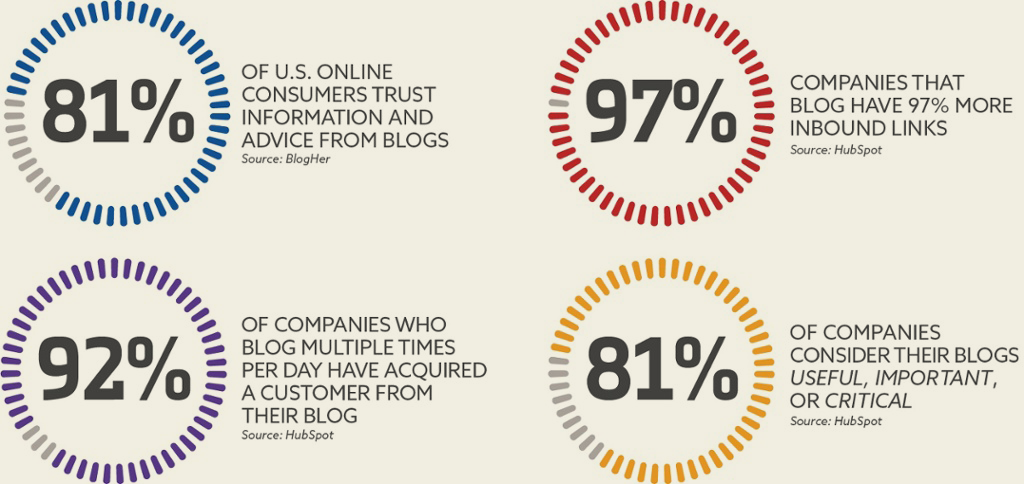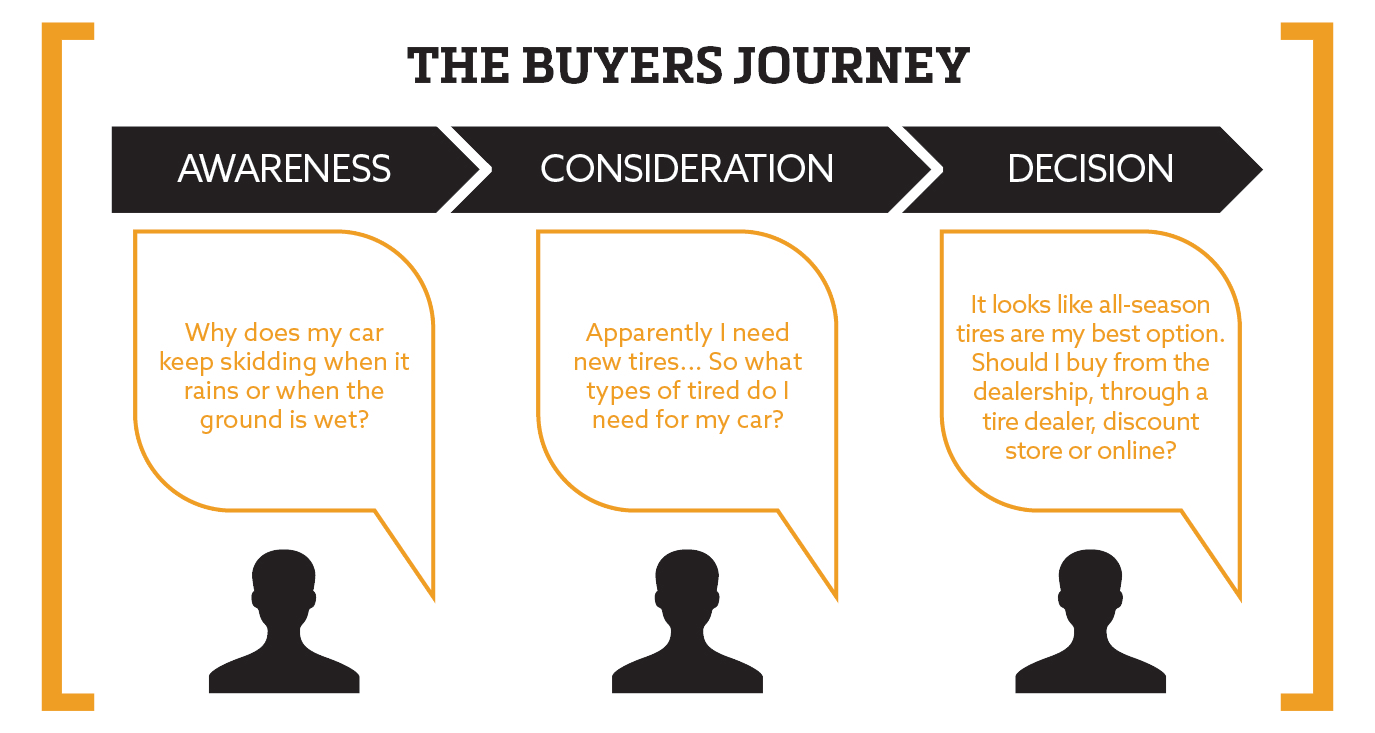Should our company start a blog? Well, check out these stats:

- 81% of U.S. online consumers trust information and advice from blogs (Source: BlogHer)
- Companies that blog have 97% more inbound links. (Source: Hubspot)
- 92% of companies who blog multiple times per day have acquired a customer from their blog. (Source: HubSpot)
- The most active demographic group for blogging is 21-to-35 year olds with 53.3% of the total blogging population. (Source: Sysomos)
- B2B marketers who use blogs generate 67% more leads than those that do not (Source: InsideView)
- 61% of U.S. online consumers have made a purchase based on recommendations from a blog. (Source: BlogHer)
- 33% of B2B companies use blogs. (Source: InsideView)
- 37% of marketers say blogs are the most valuable type of content marketing (Source: Content Plus)
- 81% of companies consider their blogs "useful," "important," or "critical." (Source: Hubspot)
Are these the only reasons we think your organization should be blogging? No... but these stats do say something about how important blogging can be to your marketing organization.
In this post, we'll not only define what blogging is—business blogging, that is—and what it's not, but we'll also provide the reasons why blogging can be a critical part of an integrated marketing program. So let's get going.
What is Business Blogging?
Blogging is essentially the act of creating short-form (usually written) content for your website. A blog (derived from "weblog") is essentially a collection of blog posts (like the thing you're reading right now). Blogs first gained popularity in the early to mid 1990's as personal, public online journals where individuals wrote about things that interested or inspired them. While personal blogs still exist, business blogs now dominate the digital marketplace and fuel buyer decisions.
The content or subject matter of an organization's blog posts is typically related to its business or industry. For instance, ATA is a marketing & advertising agency so our blog posts are centered around topics like inbound marketing, social media, content development, etc. Perhaps equally important to what it is, a business blog is NOT a space solely for promoting and selling your goods or services (you'll understand why in the following sections). The best blogs are those that seek to earn their ideal customers' trust by providing answers to questions they have or solutions to problems they are experiencing.
So how does this work? Keep reading.
Why Your Organization Should be Blogging
Before we get to the specific reasons, we need to discuss a couple of topics that form the basis for why your organization should be blogging:
- The Buyer's Journey
- Search Engine Optimization
Let's start with the Buyer's Journey. As most of today's companies continue to look for new ways to use the internet to promote their products or services, the internet continues to change the very way consumers purchase those same products and services. Through the web, consumers have gained the ability to:
- Consume information when they want and how they want
- Educate themselves about many possible solutions to problems or answers to questions
- Formulate opinions and make purchase decisions based on their own research and the opinions of their peers—without a sales person to "help" the process
This change in buyer behavior has led to the development of modern digital marketing methodologies like Inbound Marketing which focuses on working with today's buyer behavior, not against it (check out our Inbound Marketing vs. Outbound Marketing blog post to learn a little more about Inbound Marketing). Working with today's buyer behavior means truly knowing your potential customers and addressing their needs (through content) as they become aware of, evaluate, and ultimately purchase your products or services. This is called The Buyer's Journey and it's made up of three stages:
- Awareness Stage: The buyer realizes they have a problem
- Consideration Stage: The buyer defines their problem and researches options to solve it
- Decision Stage: The buyer chooses a solution

So why does this matter and how does blogging fit in? One "word": SEO!
Ok, so technically SEO (Search Engine Optimization) isn't a word. But SEO has been (and continues to be) a critical component of any marketing mix. You can find a ton of information about SEO on the web, but to cut through minutia and get to its essence, SEO is about making your website and the specific pages within your website more relevant to people who are searching for specific information by using a search engine (like Google). That's it!
Of course, there's a lot more to it from a technical, tactical, and execution side, but at the end of the day, that's all SEO really is. When a user searches for specific information—by typing a keyword or keyword phrase into the search engine search bar—will one of your web pages come up as one of the top results for that specific keyword or keyword phrase? Google decides which pages should come up first with an ever-changing algorithm that assesses the relevance of a specific web page (also known as the page authority) to what the user is INTENDING to find based on the keywords that he types into the search bar. As you can imagine, a specific web page may be extremely relevant for a specific keyword and completely irrelevant for another keyword.
So you're probably still wondering what in the world all this has to do with blogging and today's buyer behavior. Well, let's get to the reasons why your organization should be blogging and we think it will all make sense.
Reasons You Should Be Blogging

REASON 1: Blogging helps you create unique/specific pages that target specific keywords that the other pages on your website can't possibly target (or at least target effectively). This helps your SEO and, in turn, increases your organization's online visibility.
Think about the various pages on your current website. You probably have some pages that talk about your product categories and pages that wax poetic about specific products. You probably have an "About Us" page (which rarely gets a visit) and a home page that has a whole bunch of content that tries to help the user get to specific spots on your site. Companies are usually pretty good at optimizing these pages because they refer to something or someone they know pretty well: THEMSELVES.
But now think about the infinite number of ways that your potential customers might search for something that's related to the product or service you offer. As you're thinking of this infinite list of potential keywords, don't limit yourself to things that are specifically related to the product you sell. Go further! Today's buyers don't just search for information about specific products. They search for solutions to problems, answers to questions, validation to concepts they've heard about, and much, much more.
So how do you get your website to show up on a search engine results page (SERP) for all of the possible search terms that your potential customers may search for?
You'll need to add content that matches those search terms to your website. We're talking actual, relevant words that a search engine could crawl and index. Now, you could try to (somehow) shoehorn that content into each of the pages you already have, but you already know how ridiculous that would be. The reality is that no single page on any website could possibly be optimized for EVERY possible keyword phrase that a person might use to find the content of that page. And those websites that try to stuff their pages with keywords in the hopes of "optimizing" their content are actually hurting themselves. Google hates it and it makes for a bad user experience (Google hates that too... but, more importantly, so do your potential customers). The best thing you could do to optimize these "traditional" pages on your website is to make sure that their content is "useful, information-rich and uses keywords appropriately and in context" (that's straight from Google).
That's where blogging comes in. Not only can each blog post address a specific topic that your potential (or ideal) customers are interested in, but each blog post can (and should) be optimized for a specific keyword phrase that your potential customers are actually searching for. Of course, you need to get to know your ideal customers so you CAN make some hypotheses about the topics they are interested in and about the words they actually search for. Truly getting to know your ideal customers (building persona profiles)—their needs, their goals, their pain points, the problems they are trying to solve—is a critical part of any digital marketing initiative including the decisions you make for your website and the topics you choose for your blog.
Once you've developed your list of potential topics and keywords, there are various tools available on the web that allow you to reserach how often a specific string of keywords is being searched. These tools can also tell you how difficult it might be to get your content onto the first page of search results, which is where you want to be. At that point, it's up to you to decide which keyword phrases you choose to target. You can choose those that are searched more often but might be more difficult to achieve a first SERP placement or go the opposite route by targeting phrases that aren't searched as often but where your blog post might have a better shot at getting a first SERP placement.
The cool thing is that each blog post creates a new page that's optimized for a keyword phrase that you would have otherwise had a difficult time including into the content of your website, thus helping your SEO and increasing your organization's online visibility. The more quality pages you include on your website, the better the chance that your potential customer can find you in their searches.
But as you learned earlier in this post, SEO is as much about having the right content as it is about how much "authority" your content (or web pages) have. And that's also where blogging works for you. Because the content of your blog posts is designed to engage your ideal customers by providing answers to questions they have, solutions to problems they are experiencing, and (generally) things that they are interested in, your blog posts are more likely to be linked to by other web pages and/or shared (through social media, email, etc.) than your "traditional" web pages. Think about how that works:

- Optimizing your blog post around popular keywords gives you the opportunity to rank well in search results, increasing the visibility of your content.
- This visibility should increase the amount of potential customers viewing your page and the amount of traffic you're directing around your website.
- If other brands and content creators looking to attract your ideal customer find your blog post paticularly useful or interesting, they'll want to link to your blog post to improve the quality of their content. Additionally, potential or existing customers can share your blog post across social media platforms for the same reasons, which is basically another form of linking. THe more inbound links your blog post recieves, the higher it ranks in search engines.
- Compounded together, all of these processes contribute to the authority of your page as well as your website as a whole. That authority contributes to the overall SEO of your site, which means that search engines consider you a credible source and will generally rank you higher in search results to begin with.
REASON 2: Because the topics of your blog posts will vary, you can create specific calls to action within each blog post to encourage your target audience to engage with your brand in various ways, thus kicking off the conversion process.
Before we get too far, let's define what we mean by the term "conversion process". Simply put, a conversion process is the method by which you turn a website visitor into a lead. While every organization's definition of a lead is different, the one thing that all leads have in common is that you know more about a lead now than you did before they became a lead. That is, a lead will have willingly provided you with some information that you've determined is particularly useful and that allows you to qualify them for further engagement—which would ultimately lead to a sale if all goes well.
So what does blogging have to do with this?
As we discussed in the previous section, if done properly, each of your blog posts will feature a different topic that's of some interest to your ideal customer and also be optimized around a specific keyword phrase that you know your ideal customer is searching for. Because of this, you'll be able to guide your visitors to specific content on your website based on the content of each blog post. That is, based on the content of the blog post that they are reading (which answers a question or provides a solution to a problem that you know they have), you can provide your visitors with links to other content on your website that might also be of interest to them — and oftentimes, those links will be for an offer of some downloadable content in exchange for their information. The cool thing is that the keywords they searched for, the blog post that they read, and the related content to which you guided them are all great pieces of data to qualify your lead and to help you understand where your visitor is in his Buyer's Journey. This is how your blog can kick-off the conversion process.
Final Thoughts on Business Blogging
Business blogging works when done properly, but your blogging efforts may not necessarily yield immediate results. For any web page to gain enough authority for Google to take notice, it will take a little time. However, there are some things you can do to help move things along:
- Blog Prolifically: don't forget that each blog post is optimized around a specific keyword phrase. So the more blog posts you generate targeting more relevant keyword phrases, the more chances you'll have to achieve first SERP placement for any one of those keywords.
-
Think Altruistically and Be Interesting: make sure the topics and the content of your blog posts is designed to engage your target audience—particularly your ideal customers. We mentioned this before but it's worth repeating: focus on earning your ideal customer's trust by providing answers to questions they have or solutions to problems they are experiencing, but also make sure that your blog posts are interesting and enjoyable to read. This will not only open the doors for further engagement (and future sales), but it will also make your content much more share-worthy. Beyond all that, don't forget that blogging is also an opportunity to develop your brand's voice and authority. The more your target audience reads your blog posts, the more they should feel like they are getting to know your organization's brand, its values, its promises, and its expertise.
-
Distribute Your NEW Blog Posts: yes, blogging properly does wonders for your SEO, but you don't have to rely on the promise that "if you build it, they will come" (blogging isn't Field of Dreams). If you have a great blog post, share it with your audience through your email communications and social media. Not only will this help your blog post gain visibility, but it will put it in a place where your audience is comfortable sharing great content (which will help your SEO in the long run).
-
Re-Distribute Your OLD Blog Posts: one of the great things about blogging is it continues to work for you way past the initial publish date. Think of it this way: let's say you write a blog post and optimize it around a keyword that is being searched for 500 times per month. That keyword could be searched for 500 times next month and 500 times per month (or possibly even more) a year from now. That's 500 opportunities to get your blog post in front of your target audience this month, next month, and every month for the foreseeable future. So if you wrote something 8 months ago, it could still be extremely relevant to your audience today... so don't be afraid to share it.
If you came here questioning whether or not you should start a blog for your organization, hopefully we've shown you why and how blogging works. Blogging isn't easy, but there's a method to the madness, and there's a way to do it right. If you commit the proper resources, understand how it can work for you, and make blogging a priority in your digital marketing mix, the results for your organization can be truly impactful.










